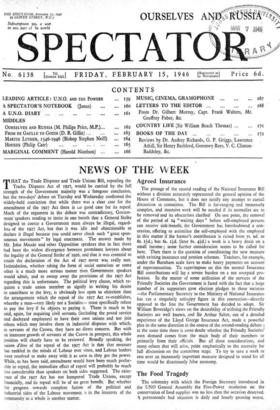Agreed Insurance
The passage of the second reading of the National Insurance Bill without a division accurately represented the general opinion of the House of Commons, but it does not justify any attempt to curtail discussion in committee. The Bill is far-ranging and immensely complex, and intensive work will be needed if its anomalies are to be removed and its obscurities clarified On one point, the removal of the period of 24 "waiting days" before self-employed persons can receive sick-benefit, the Government has foreshadowed a con- cession, offering to assimilate the self-employed with the employed in this matter if the former's contribution is raised from 5s. 9d. to 6s. rid.; but 6s. 'id. (later 6s. 41d.) a week is a heavy drain on a small income ; some further consideration seems to be called for here. Then there is the question of coordinating the new measure with existing insurance and pension schemes. Teachers, for example, under the Burnham scale have to make heavy payments on account of superannuation. To superimpose on this the normal Insurance Bill contributions will lay a severe burden on a not overpaid pro- fession. In the matter of some utilisation of the services of the Friendly Societies the Government is faced with the fact that a large number of its supporters gave election pledges to these societies —the Parliamentary Secretary to the Ministry of National Insurance has cut a singularly unhappy figure in this connection—directly opposed to the line the Government has decided to adopt. Sir William Beveridge's views on the desirability of utilising the Friendly Societies are well known, and Sir Arthur Salter, out of a detailed experience of the Lloyd George Insurance Act, made a powerful plea in the same direction in the course of the second-reading debate ; at the same time there is some doubt whether the Friendly Societies' own demand comes from the main body of their members or primarily from their officials. But all these considerations, and many others that will arise, point emphatically to the necessity for full discussion on the committee stage. To try to save a week or two over an immensely important measure designed to stand for all time would be disastrously false economy.


























